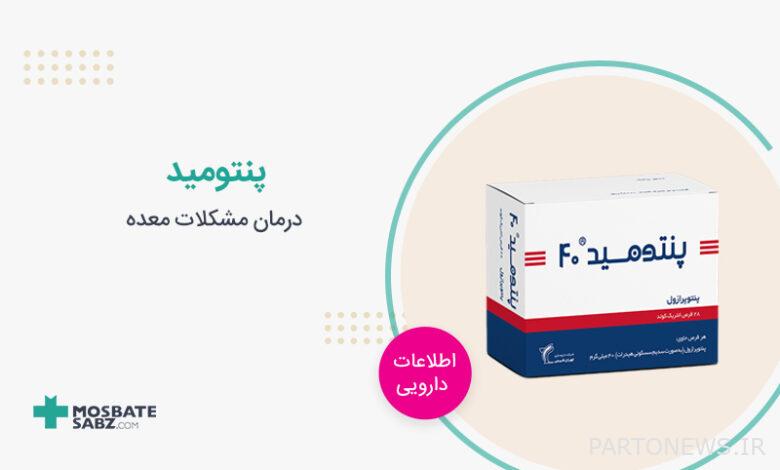What is the drug Pantoprazole or Pantoprazole for?

The stomach is one of the most vital organs for the process of digesting food and providing nutrients to the body. But when stomach acids increase to a very high level, it can become a serious problem and cause complications such as excess secretion of stomach acid, heartburn and stomach ulcers. In this context, anti-acid drugs play a very important role and one of the effective drugs in this regard is Pentomid. Pantoprazole, as an antacid drug, has been able to help balance and control the level of stomach acidity. By combining effective elements that act as antacids, this drug has a positive effect on increasing the level of stomach acidity and provides relief to patients with stomach problems.
What we read in this article
Pharmaceutical forms of Pantomid
Pantomid drug is available in the form of oral suspension 40 mg in a package, powder for injection 40 mg in a vial, delayed-release tablets 20 mg and 40 mg. The common forms of this drug in Iran are pentobiozol, Pentos, Pentos 40 tablets, Penzol, Pentosek, Pepticer tablets, enteric coated tablets, Pentochem, Pantocid, Pantoprazole Nolpase, Avi Pento 40 tablets, Pantoprazole and… is.
- The biggest changes that will happen in WhatsApp this yearFebruary 3, 2024
- Applications for locating family and friends on AndroidFebruary 2, 2024
Uses of Pentomid tablets
Pentomid is used to treat certain stomach and esophagus problems (such as acid reflux), which works by reducing the amount of acid your stomach makes. This medicine relieves symptoms such as heartburn, difficulty in swallowing and cough. This process helps to heal acid damage to the stomach and esophagus, prevent ulcers, and prevent esophageal cancer. This drug belongs to a class of drugs known as proton pump inhibitors (PPIs). The injectable form of this medicine is used for a short time when you cannot take the medicine orally. Also, if possible, your doctor should switch you to an oral form.
Uses of pantoprazole tablets in adults
- Zollinger-Ellison syndrome
- Peptic ulcer disease (off label)
- Short-term treatment of GERD
- Erosive esophagitis associated with GERD
Uses of pantoprazole tablets in children
- Erosive esophagitis associated with GERD
Pharmacological effects and mechanism of action of pantoprazole
PPIs; It binds to the H+/K+ exchanger ATPase (proton pump) in gastric parietal cells and thus blocks acid secretion. This drug has a bioavailability of 77%, onset of 24 hours (initial response) and duration of 7 days (PUD). It is also extensively metabolized by the hepatic P450 enzyme CYP2C19, the second pathway being via CYP3A4. Poor metabolizers (3% of Caucasians and African Americans) are deficient in the CPY2C19 enzyme system. Plasma concentrations can be increased 5-fold or more compared to those with the enzyme. 71% of this medicine is passed through the urine; 18% feces are excreted.
The dosage of pantoprazole
Pantoprazole is administered by intravenous injection as prescribed by the doctor. The dose and length of treatment is based on your medical condition and your response to treatment. If you are taking medicine without a prescription, check the drug information on the medicine package. If your illness worsens, stop taking the medicine and see a doctor. The dosage should be determined by the doctor based on the type of disease, medical records and age of the patient. Indiscriminate and non-prescription use of any drug can have dangerous side effects.
Time to take Pentomid tablets
In addition to adults, Pentomid drug is also used in children, which can be used with the approval and prescription of a doctor. This drug is used in erosive esophagitis associated with GERD in children. The safety and effectiveness of this drug in children under 5 years has not been proven. But for children over 5 years old and weighing 15 to 40 kg, 20 mg per day for up to 8 weeks, and 40 mg per day for up to 8 weeks for 40 kg or more.
Precautions
Before taking Pentomid, if you are allergic to it or similar drugs (such as lansoprazole, omeprazole), avoid using it. This medicine may contain inactive ingredients that can cause allergic reactions or other problems. Before using any medication, inform your doctor about your medical history, such as liver disease, lack of certain minerals in the body (such as zinc), lupus, etc. Proton pump inhibitors (such as pantoprazole or pentomide) may increase the risk of bone fractures, especially with longer use, higher doses, and in the elderly.
- Proton pump inhibitors (PPIs) are possibly associated with an increased incidence of Clostridium difficile-associated diarrhea (CDAD). Consider the diagnosis of CDAD in patients taking PPIs who have diarrhea that does not improve.
- Cutaneous lupus erythematosus (CLE) and systemic lupus erythematosus (SLE) have been reported with PPIs. Avoid taking more than the specified time. If signs or symptoms consistent with CLE or SLE are observed, discontinue and refer the patient to a specialist. Most patients recover with PPI discontinuation alone in 4-12 weeks.
- Severe cutaneous adverse reactions, including Stevens-Johnson syndrome (SJS) and toxic epidermal necrolysis (TEN), drug reaction with eosinophilia, systemic symptoms (DRESS), and acute generalized exanthematous pustulosis (AGEP), have been reported. Discontinue treatment and consider further evaluation at the first signs or symptoms of severe skin adverse reactions or other signs of hypersensitivity.
- Published observational studies suggest that PPI therapy may be associated with an increased risk of osteoporosis-related fractures of the hip, wrist, or spine, particularly with long-term (>1 year) high-dose therapy.
- Decreased gastric acidity increases serum chromogranin levels and may cause false positive diagnostic results for neuroendocrine tumors. Temporarily discontinue PPI before assessing CgA level.
- Long-term daily use (eg, more than 3 years) may result in malabsorption or cyanocobalamin deficiency.
- Symptom relief does not eliminate the possibility of stomach malignancy. Consider follow-up and additional diagnostic testing in adult patients who have a suboptimal response or recurrence of initial symptoms after completing PPI therapy.
- Acute tubulointerstitial nephritis (TIN) has been reported in patients taking PPIs. Patients may present with different signs and symptoms ranging from symptomatic hypersensitivity reactions to non-specific symptoms of decreased kidney function (such as fatigue, nausea, anorexia). In the reported case series, some patients were diagnosed on biopsy in the absence of extrarenal manifestations (such as fever, rash, or arthralgia). In these cases, stop treatment and evaluate patients with suspected acute TIN.
- The risk of salmonella and campylobacter infections was increased with the use of proton pump inhibitors.
- PPI treatment is associated with an increased risk of fundic polyps. The risk increases with long-term use of 1 year. Also, the patient may be asymptomatic and the problem is usually detected incidentally during endoscopy.
Hypomagnesemia and mineral metabolism of Pentomide (pantoprazole)
- Hypomagnesemia occurs with long-term use (more than 1 year) in some patients, which may cause side effects. Some of these complications include tetanus, arrhythmia, and seizures. It is in 25% of the investigated cases. Monitor magnesium levels before starting PPI therapy and periodically.
- Hypomagnesemia in some cases leads to hypocalcemia or hypokalemia and exacerbates underlying hypocalcemia in at-risk patients. In most patients, treatment of hypomagnesemia required magnesium replacement and PPI discontinuation.
- Consider monitoring magnesium and calcium levels before initiation of therapy and periodically during therapy in patients at pre-existing risk for hypocalcemia (eg, hypoparathyroidism). If necessary, stop taking the drug or use similar drugs.
Contraindications to the use of Pantomid
- Hypersensitivity to pantoprazole or other proton pump inhibitors (PPIs)
- Simultaneous use with products containing rilpivirine
Pantoprazole side effects
Headache, dizziness, abdominal pain, general or facial edema, itching, rash, etc. are some of the side effects of pantoprazole. Redness, pain, or swelling at the injection site may also occur. If any of these effects persist or worsen, tell your doctor or pharmacist right away. Most people who use this drug do not experience serious side effects. Some of the serious side effects of this drug include symptoms of low blood magnesium levels (such as muscle spasms, irregular heartbeat, seizures), lupus symptoms (such as rashes on the nose and cheeks, new or aggravated joint pain) and…
- Headache
- stomach ache
- facial swelling
- general idiot
- Chest pain
- Diarrhea and constipation
- itching
- rush
- flatulence
- hyperglycemia
- nausea
- Vomit
- sensitivity to light

Pentomid drug interaction (pantoprazole)
Drug interactions may change how your medications work or increase your risk of serious side effects. List your medications and show them to your doctor when you visit. Methotrexate drug (especially high dose treatment) has a drug interaction with this drug. Also, some drugs like ampicillin, atazanavir, erlotinib, levoctoconazole, nelfinavir, pazopanib, rilpivirine, sparsentan, some azole antifungal drugs (itraconazole, ketoconazole, posaconazole) and… also change the action of pentomid. In some cases, the use of proton pump inhibitors may cause errors in neuroendocrine tumor diagnostic tests and tetrahydrocannabinol urine tests.
Use of pantoprazole during pregnancy and breastfeeding
There are not enough studies related to pantoprazole in pregnant women. Warn pregnant women about the possible risk of fetal harm. The drug should be used during pregnancy only if the possible benefit justifies the potential risk to the fetus. Pentomid drug and metabolites are excreted in rat milk in animal studies. Excretion of this drug in human milk has been detected in a study in a nursing mother after an oral dose of 40 mg of pantoprazole (Pentomid) sodium. Many drugs that are excreted in human milk have the potential to cause serious side effects in nursing infants.
Storage conditions for pantoprazole
Pantomid medicine should be stored at room temperature and away from light and moisture. All chemical and herbal medicines in different pharmaceutical forms should be kept out of the reach of animals and children.
The last word about Pentomid tablets (pantoprazole)
As we said in this article from Positive Green Online Pharmacy magazine, Pentomid drug is known as an effective stomach acid antacid drug and a reliable tool in the treatment of stomach problems. Its importance in improving the quality of life of patients and increasing the general health of society cannot be ignored. For this reason, further development and research in this area should be done to support access to more effective treatments for patients with stomach problems. Note that this medicine should be used with a doctor’s prescription so that the patient does not suffer from complications such as rash, bloating, hyperglycemia, nausea, headache, etc.
Site source: Medscape

